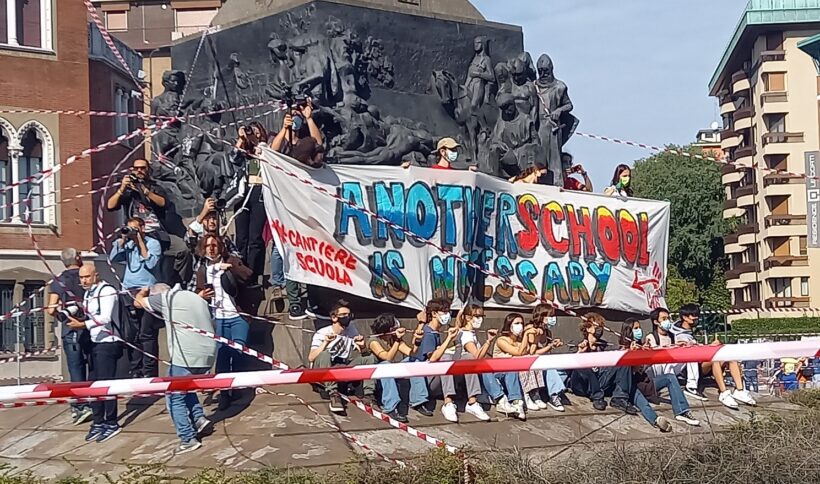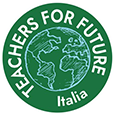
For an ecological reform of the Italian school
All those who intend to start an ecological reform process of Italian schools are invited to sign the following open letter to the Minister of Education, school headteachers, teachers, male and female students, parents, to the entire civil society:
The multidimensional and multisectoral crises that are compromising the very same biological foundations of every human activity need systemic, radical and urgent responses. The destructive impact of the current socio-economic system on Nature has far exceeded the rhythms and possibilities of regeneration of our planet, pushing all life on Earth towards drastic worsening.
The School and the world of Culture in general are called to play a leading role in this scenario, by becoming the bearers of the widest possible debate, not only on the tools to put in place to contrast the ecological crisis, to stop the loss of biodiversity, for the mitigation and adaptation to climate change, but also for the necessary transformation of the cultural and educational model at its root.
It will be necessary that a new culture has as its foundation the recognition of the human being as an integral part of Nature. It is necessary to restore this inseparable relationship which has been denied by the models of life imposed by economics, by individualism, by greed. This has created an increasingly competitive, consumerist society and affected by technological and now also digital hypertrophy, which is confining physical and emotional relationships to a virtual dimension detached from the ecosystemic reality that includes us.
In an era of “digital natives”, it is necessary to literate a new generation of ecological natives, to re-naturalise a humanity that struggles to think of itself as connected to biophysical reality; it is necessary to decolonise the imaginary by questioning some axioms of modern culture such as anthropocentrism, utilitarianism, mechanism, techno-economicism, placing instead at the centre the paradigm of the connection of each entity with the “whole”, of the harmonious balance between humans and Nature.
This means imagining and discussing scenarios that go beyond the measures taken today by a surface ecology based on “green growth” or “sustainable development”, both characterised by an optimistic faith in ready-to-use technological solutions.
In this context it is essential that the school system encourages a critique of the current cultural and educational model and develops a new vision based on a profound and integral ecology, respectful of the regenerative cycles of life, of universal common goods, of equitable sharing of the riches and dignity of every living being, present and future.
The school, also according to the constitutional mandate, should not be aimed at training “resources” for the labor market, but at the integral formation of the person and at a transformative ecological and social education, characterised by a scientific, literary and artistic approach which, overcoming the fragmentation of disciplines, moves towards a connective knowledge, capable of promoting knowledge of the interrelationships of the ecosystem and of generating a civic and critical conscience aware of the complexity of the present challenges.
We need a truly participatory, inclusive and intercultural education, which recognises the centrality of relationships between people, with Nature and with the territory to give life to a school that knows how to welcome the specificities of the community on which it insists, valuing the cultural and linguistic ones just as the differences of origin. A school where knowledge is learned and work practices with and for Nature are developed to contribute to the resilience of the territory; where every male and female student can understand the terms and causes of the ongoing ecological and social crisis, process thoughts and emotions about it and become capable of imagining and building new tools to deal with it. A school that recognises Ecology as an indispensable cultural heritage.
We therefore ask:
to the Minister of Education,
to rethink the very foundations of primary and secondary education, aiming at an ecological literacy of the new generations capable of overcoming any idea of separation between humanity and nature. This requires the revision of the entire epistemological system of the disciplines and the overcoming of their rigidity and sectorialisation in favour of a systemic teaching that cannot make a rigid distinction between “human sciences” and “hard sciences”;
to re-discuss the Guidelines for the teaching of civic Education (adopted in application of law n. 92/2019) by implementing the transversal teaching of ecological Education, so that it becomes the paradigm for a revision of the school curricula;
to recompose the teaching of the 33 hours foreseen for each year of the course, in a single vision of integrated ecological education, since as currently set up, i.e. divided into three separate axes of the study of the Constitution, sustainable development and digital citizenship, it doesn’t allow us to grasp the unitary and relational dimension (ecological, technological, social and political) of life on the planet;
to school headmasters and collegial Bodies,
to start the construction of school curricula that have ecological Education as a reference frame, the ongoing ecosocial crisis, the necessary cultures and knowledge to cross it, in such a way as to make the school the place of a transforming Education in the sense of constitutional values , both through the definition of the guidelines of the Training Offer Plan, and through the proposal of an accurate plan of integrated ecological training for the teachers;
to enhance, in this process, the active contribution of students who must be able to influence and act on decisions regarding their education; to include the requests received from the territory, from environmental and social movements, from solidarity and civil economy communities, from bodies responsible for protecting common goods, from all those cultural, artistic and creative realities that go in the direction of a new model of society and care Economy;
to the teachers,
to direct their training and educational action according to the principles of Ecology, through transdisciplinary paths and involving boys and girls in educational processes beyond the schemes of the simple frontal lesson, in order to promote a knowledge of nature based on science and on love for living beings, on the union of all things and on the spirit of cooperation that will necessarily have to animate the cultural change we need;
to male and female students,
to immediately request inclusive, participatory and active training that develops awareness of the ongoing ecosocial crisis and that respects their right to acquire systemic and critical knowledge in order to make them capable of responding adequately to the great challenges of the present;
to parents,
to actively stimulate educational Institutions of all levels, through all available instruments (parents committee, commissions open to parents, class councils, school councils), so that they operate a courageous educational reform based on Ecology, capable of implementing that change of mentality and practices that can finally envisage a more equitable, sustainable, joyful future for one’s sons and daughters, and for generations to come;
to civil society,
which supports and accompanies a renewed educational commitment of the Italian school in the direction illustrated above; in fact, no true ecological breakthrough can be implemented without the school’s meaningful involvement in this fundamental challenge of our time.
for info write to:
alfabeti.ecologici@gmail.com
FIRST SIGNERS
Anna Angelucci, National Association “For the school of the Republic”
Vincenzo Balzani, Professor Emeritus of the University of Bologna, Academician of the Lincei
Gianfranco Bologna, Honorary President of the Scientific Community of WWF Italy, full member of the Club of Rome, General Secretary of the Aurelio Peccei Foundation.
Mauro Bonaiuti, University of Turin, President of the Association for Degrowth
Federico Butera, Professor Emeritus of the Milan Polytechnic, School Regeneration Plan Technical-Scientific Committee
Monica Capo, National Spokesperson for Teachers For Future Italy
Claudio Cassardo, Researcher and professor of meteorology, climate and atmospheric physics
Piero De Luca, Headmaster of the Sauro-Errico-Pascoli Comprehensive Institute (Naples)
Lorenzo Fioramonti, Director of the Institute for Sustainability, University of Surrey (UK)
Carlo Firmani, Headmaster of the Socrates High School in Rome, Founder of the National Network of Green Schools
Silvestro Greco, Marine biologist, Research Director at the A. Dohrn Zoological Station
Simone Lanza, Elementary Teacher, Pedagogist, University of Milan Bicocca
Adriana Maestro, Freelance Researcher, Director of the School for Transformative Economy (SET)
Roberto Mancini, Professor of Theoretical Philosophy, University of Macerata, Director of the School for Transformative Economics (SET)
Laura Marchetti,Professor of Cultural Anthropology and Didactics, University of Reggio Calabria
Marta Maroglio, national spokesperson for Fridays For Future Italy
Luca Mercalli, President of the Italian Meteorological Society
Renata Puleo Teacher, former headteacher of Rome, ALaS Association
Maria Santarossa, Co-founder and national contact person Parents for Future Italy
Danilo Selvaggi, General Manager of Lipu – BirdLife Italy
The complete list of all signatories is available at this link.
ITALIAN

